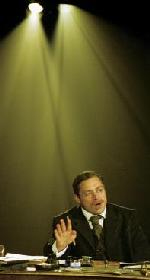SEARCH CurtainUp
REVIEWS
FEATURES
NEWS
Etcetera and
Short Term Listings
LISTINGS
Broadway
Off-Broadway
BOOKS and CDs
OTHER PLACES
Berkshires
London
LA/San Diego
Philadelphia
Elsewhere
QUOTES
On TKTS
LETTERS TO EDITOR
FILM
LINKS
MISCELANEOUS
Free Updates
Masthead
NYC Weather
 London Review
London Review
Americans
by Ben Clover
|
If I can't pronounce your name, you ain't American
--- Bull |

Paul Rider as Theodore Roosevelt
(Photo: John Haynes) |
Americans follows the 1901 assassination of President McKinley (Ed Bishop) by a young anarchist and attempts to show its repercussions both on history and on the men and their families. It only really succeeds at one of these tasks and at times you can almost see the essay title hanging behind the play: "The McKinley assassination prompted the birth of an American Empire in the early twentieth century." Discuss. This is not an uninteresting historical question but it's not as well realised as a drama as it could have been.
Never the most famous of murdered statesmen, I have only seen McKinley's death tackled in contemporary drama by Sondheim's Assassins and even that skips swiftly past to better known presidents. Answering his own question, Schlosser takes the assassination as a key moment in the birth of an American Empire. In a result dripping with irony as peaceable McKinley is replaced by a bullish Theodore Roosevelt (Paul Rider), a man who initiates the very thing the assassin had tried to thwart.
The Oxford Stage Company's production of Americans presents us with action and exposition at a rapid rate and the performances go a long way towards energising a play that sometimes feels a little too like a documentary. The private lives of McKinley and his killer are assayed but don't seem to fall near the heart of the play. Instead the assassin Leon Czolgosz' (Bo Poraj) arguments with his jailor seem to edge out everything else, a shame considering the host of other interesting characters. Ed Bishop played the gut shot McKinley's slow death with a lot of dignity, such that you wonder how so nice a man could order the invasion of the Phillipines. The supporting cast were all very capable and Colin McCormack as Mark Hanna was supremely creepy in his king-making scene with Roosevelt.
Credit is due to the lighting and stage managers who make excellent use of the Arcola's deep stage. Characters and whole scenes loom suddenly out of the darkness giving the impression of a flash light briefly illuminating areas of history before moving on. The music between scenes sounded like a set of eerie variations on famous American anthems and was as apt and unsettling as the staging. Dominic Dromgoole's direction kept things moving at as brisk a pace as possible without seeming rushed and he deserves credit for giving the play a life it could easily have lacked. There are some mis-steps, onstage electrocution rarely convinces, but generally this is a slick evening.
This is a better production than it is a play. With its even handed, journalistic feeling too heavily entrenched, Americans can feel more like a dramatisation than a drama, an account rather than a story. Perhaps the topic is still too chronologically close to have the element of myth the best History plays need. Lack of material and sources can sometimes give the writer more room for manoeuvre than an archival abundance. Either way, this thoughtful evening shows several different kinds of American, from a Radical far outside the centres of power to one thrown suddenly to their very centre. It's a cleverly ambiguous title for a play that looked as if it were about to endorse generalisations but instead defies them.
| Americans
Written by Eric Schlosser Directed by Dominic Dromgoole With: John Dougall, Colin McCormack, Paul Rider, Ed Bishop, Sophie Duval, Bo Poraj, Graham Turner, David Ganly, Polly Adams Lighting Designer: Paul Anderson Sound Designer: Mike Winship Costume Superviser: Christina Cunningham Running time: Two hours 15 minutes with one interval . Box Office: 020 7503 1646 Booking to 22nd November 2003 Website: Oxford Stage Company www.oxfordstage.co.uk Reviewed by Ben Clover based on 29th October 2003 Performance at the Arcola Theatre, Arcola Street Hackney London E8 (Tube: Highbury & Islington, then bus 30 or Liverpool Street, then bus 149 Rail: Dalston Kingsland Station - North London Line) |


Mendes at the Donmar
Our Review

Peter Ackroyd's History of London: The Biography

London Sketchbook

Somewhere For Me, a Biography of Richard Rodgers

At This Theater

Ridiculous!The Theatrical Life & Times of Charles Ludlam

The New York Times Book of Broadway: On the Aisle for the Unforgettable Plays of the Last Century

6, 500 Comparative Phrases including 800 Shakespearean Metaphors by CurtainUp's editor.
Click image to buy.
Go here for details and larger image.



